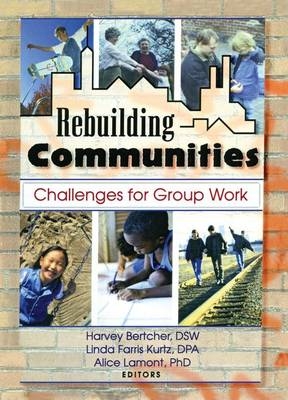
Rebuilding Communities
Routledge (Verlag)
978-1-138-99707-3 (ISBN)
- Titel ist leider vergriffen;
keine Neuauflage - Artikel merken
learning that your role of caring and advocacy as a group worker must be a complete and lifelong commitment and that you must be prepared to use your skills throughout your everyday life to make a difference
using the World Wide Web to form groups whose members can support one another through the anger, joy, pain, and challenges of life
learning how group work can help calm the stormy transitions that adolescent immigrants face by helping them relate to other children who are in similar circumstances
examining how parents of pediatric urology patients find solace through groups where they can address such sensitive issues as the future of sexual functioning and fertility for their children
discovering how marathon group sessions in South Africa are helping to provide basic services to the disadvantaged with programs to facilitate interracial contact and understanding among women and programs for adolescents boys in foster careRebuilding Communities offers you a deeper understanding of the total positive effect that group work can have on various sectors of your community to help you provide better services to those in need. This unique book focuses your attention on the importance of group work to community development and even provides you with a glimpse into the future of group work. With Rebuilding Communities you will discover a multifaceted approach to solving problems that communities face to help you choose the best options for your own community and give the best possible services to the people you assist.
Contents
About the Editors
Contributors
Preface
Acknowledgments
Introduction
Section I: Keynote Speakers
Chapter 1: Strengthening Communities Through Groups: A Multicultural Perspective
Introduction
Our Perspective on Community Empowerment and Multiculturalism
Examples of Multicultural Empowerment in Groups
Commitment
Closing
Chapter 2: Community Building and Social Group Work: A New Practice Paradigm for American Cities
Community Building: What Is It?
The Approach: How Does Community Building Work?
Conclusion
Chapter 3: From Local to Global: Groups at the Heart of the Community
the Global Traveler in Group Work--An Example
Asking the Question, “Why?”
Intervention for Resistance Against Oppression
Conclusion
Section II: Invitationals
Chapter 4: Towards a Community of Care: The Development of the Family Caregivers’ Support Network
What Is Caregiving?
Who Are the Caregivers?
Why Care?
Social Programs and Supports for Caregivers
History of the Family Caregivers Support Network at the Self-Help Resource Centre
Barriers to Funding
Outcomes of the Project to Date
Implementation of an Information and Referral Service for Caregivers
Development of New Self-Help Groups for Caregivers
Development of a Database of Community Resources for Caregivers
Publication and Distribution of a Newsletter for Caregivers
Educational Workshops for Caregivers
Development of a Peer Support Service for Caregivers
Development of a Caregiver-Driven Network Structure
Implementation of New Outreach, Research, and Advocacy Initiatives for Caregivers
Development of a Self-Help/Mutual Aid Group for Professionals
Discussion
Chapter 5: Some Important Areas of Group Work Expertise
Group Workers Know About Democratic Processes
Group Workers Know About Group Leadership
Group Workers Know About Intergroup Relations
Group Workers Know About the Reduction of Violence and Conflict Management
Group Workers Know About Play
Group Workers Know About Involving People in Social Action
Group Workers Know How to Help People Enjoy Life
Group Workers Know about the Importance of the Group in a General Developmental Approach
Group Workers Know How to Understand the Groups as a Group
Section III: Papers
Chapter 6: AIDS Prevention for Adults with Serious Mental Illness: Improving Perceived Sexual Self-Efficacy
Conceptual Framework
Method
Results
Discussion and Implications for Social Work Practice with Groups
Chapter 7: But Does it Really Work Like That? Verifying a Piece of Social Group Work Theory
Emerging Themes
Chapter 8: Rebuilding a Divided Community Through the Use of Marathon Groups
Introduction
Historical Perspective on Marathon Groups
Possibilities for Utilization of Marathon Groups
Description of Marathon Groups
Goals of Marathon Groups
Some Characteristics of Marathon Groups
Stages in Marathon Groups
The Worker(s) in Marathon Groups
Issues Related to Marathon Groups
The Value of Marathon Groups for Social Work with Groups
Conclusion
Appendix
Chapter 9: It’s More Than a Plumbing Problem
The Patients and Their “Waterworks”
The Multidisciplinary Health Care Team
Implementation of Strategies to Meet Identified Needs
Conclusion
Section IV: Workshops
Chapter 10: Group Work with Adolescent Immigrant Groups: Issues, Obstacles, and Principles
Adolescent Immigrants: Review of Issues
Why Group Work is a Useful Modality for Helping Adolescent Immigrants
Obstacles to Effective Group Work with Adolescent Immigrants
Principles for Effective Group Work with Adolescent Immigrants
Russian Adolescents Project: An Illustration
Summary
Chapter 11: Building P
| Erscheinungsdatum | 06.09.2016 |
|---|---|
| Verlagsort | London |
| Sprache | englisch |
| Maße | 156 x 216 mm |
| Gewicht | 417 g |
| Themenwelt | Sozialwissenschaften ► Pädagogik ► Sozialpädagogik |
| Sozialwissenschaften ► Soziologie ► Spezielle Soziologien | |
| ISBN-10 | 1-138-99707-2 / 1138997072 |
| ISBN-13 | 978-1-138-99707-3 / 9781138997073 |
| Zustand | Neuware |
| Haben Sie eine Frage zum Produkt? |
aus dem Bereich


